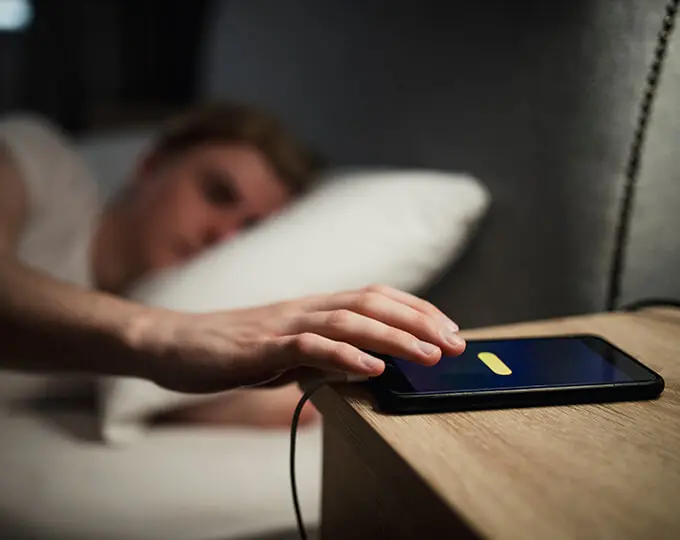
It's often harder to wake up on dark winter mornings as the cold weather and lack of light disrupts your circadian rhythm, making it harder to get out of bed.
If you feel like you can’t wake up early in winter, you should try sticking to a regular evening and morning routine, lightly exercising as soon as you wake up, and taking supplements.
Some people struggle to get up on a winter's morning due to the lack of natural light. To incorporate more light into your bedroom, you can try using wake-up lights, warmer lightbulbs, or decorating your room with light colours.
When it comes to winter mornings, often the last thing you want to do is get out of bed. Your alarm goes off, and the snooze button simply isn’t enough - you need your mattress to swallow you whole to avoid facing the freezing cold outside world.
But It doesn’t have to be like this. With a few simple adjustments to how you sleep, you’ll be able to wake up feeling refreshed this winter. And, with the winter solstice coming up, there’s never been a better time to start a new sleep cycle that’s optimised for surviving even the bleakest of mornings.
The winter solstice is the shortest day and the longest night of the whole year, offering around 8 hours of daylight. Occurring during December in the northern hemisphere, the sun rises at roughly 8:05am in the UK, destined to set again at around 4pm, depending on your location in the country.
Often seen as the start of winter, this lack of sunlight throughout the day makes everything feel a bit colder and a bit darker – because it is. Not only are we all slightly more tempted to get under the covers earlier than usual, but it can also be harder to wake up in a morning when it’s still dark outside. This is because of the role light plays in sleep science and your circadian rhythm.
Your circadian rhythm is your internal body clock, a constantly ticking 24-hour timer that controls when you feel tired and when you wake up. By regulating the release of hormones, your circadian rhythm plays a role in how well you sleep, and how you feel when you wake up.
Light is one of the biggest influences on your circadian rhythm – when light enters your eye, it sends signals to your brain, stopping the production of melatonin (the hormone which makes you sleepy). This means that on dark winter mornings, where natural light is hard to come by, you may find yourself feeling a little less alert when you wake up.
A disrupted circadian rhythm can also make it more difficult to fall asleep in an evening, meaning that you may find yourself struggling to shut off. This can also contribute to a slower start to the day as you’re more exhausted and groggier.
In the UK, the sun can rise as early as 4:40am in the summer months, meaning it’s easy to wake up naturally as the day begins around you. However, in winter, it sometimes doesn’t get light in a morning until as late as 08:05am, depending on where you are in the country.
This means it can be hard to naturally incorporate sunlight into your morning routine, impacting your circadian rhythm.
It’s not just a lack of light which can make those first steps away from your duvet feel like climbing Everest, a colder bedroom is always going to be a naturally less attractive place to start your day. This may be an even harder task in winter when you may find yourself fighting the temptation of blankets and throws when starting your day.
Disrupted sleep schedules throughout the festive period can also mean you aren’t getting as much sleep as you should in winter, especially for younger sleepers. For tips to help you or your little one's nod off this Christmas, check out our Christmas Eve sleep guide.

Difficulties getting out of bed each morning in winter is often also associated with Seasonal Affective Disorder (SAD), a depressive condition that's symptoms tend to be worse during certain times of the year, especially winter. People experiencing SAD may feel a persistent low mood, feelings of worthlessness or loss of interest in previously enjoyable activities, among other symptoms.
SAD can also impact how well you sleep each night too, as well as contribute to other sleep behaviours. Individuals with SAD may struggle to sleep each night due to the irritability caused by the condition. However, when they do fall asleep, they’re more likely to sleep for longer, and struggle to get out of bed in the morning.
Described by social media users as ‘bedrotting’, those who’re experiencing SAD may stay in bed for long periods of the day. While we all may be tempted to spend a bit more time under the duvet in winter, bedrotting can be a sign of a serious mental health condition, such as SAD, and you may need to speak to a specialist for professional support.

So if you’re struggling to drag your head away from your pillow this winter, there are a few simple tricks and hacks you can add to your sleep routine to help you have an invigorated start to the day, even in the coldest months of the year.
By now, we all know how important it is to create a routine for better sleep but the things we do in the evening also have a huge impact on how we feel in the morning. This is especially true in winter when the temptation to go to sleep early is strong. It may take a few weeks to find the perfect winter bedtime routine for you, but why not try:
Taking a warm bath or shower to help the body relax.
Listening to sleep sounds or relaxing music.
A calming activity such as reading or meditation.
A lot of these pre-sleep activities are perfect for winter as they involve keeping yourself warm or can be completed when wrapped in an electric blanket or throw to stay toasty.
Your morning routine shouldn’t need to change too much between seasons; it might just be harder to say bye-bye to your bed. By setting yourself a consistent wakeup time (yes, even on weekends) and sticking to it, you’ll be giving your body and mind a better chance of adjusting to darker, colder mornings. A good morning routine is the best way to wake up early in winter, especially as you’re naturally going to feel less alert and switched on when you first wake up due to the lack of light.
In summer months, your room will likely fill with light as you throw open the curtains as soon as you wake up. In winter, you’re more likely to be met by still-lit streetlights and wet pavements. Incorporating natural light into your morning routine in winter can be difficult when the sun isn’t around to help you out, but there are several ways you can incorporate light to make it easier to wake up in winter:
Wake-up lights are one of the most effective ways of subtly incorporating light into your bedroom in a morning. Their ascending gradient of warm tones mimics the rising of the sun for a gradual alarm in the absence of sunlight.
Warm lightbulbs are a great alternative to wake-up lights. A bulb in your bedside lamp or main ceiling light with a high lumen count and a warm colour temperature is a much more welcoming start to your day than harsh fluorescent lights.
Bright colours across your bedroom can be a great way of introducing light to your space. While it may be impractical to suggest repainting your room every year at the end of autumn, opting for brighter bedding or accessories in winter may help your room feel more vibrant on dark mornings.
The best winter morning routine should always start with leaving your bed and getting some exercise in as soon as you’re awake to warm up your body. Whether it’s a stroll with the pooch or a quick inside lap while the kettle boils, exercise is the perfect start to your morning, especially when your body needs warming up. A morning walk or relaxing exercise such as yoga can be the perfect way to alleviate any stresses or anxieties you may be experiencing. This may be particularly effective if you’re struggling with SAD as it can refocus your mind and allow you to process your emotions better.
While complementing a balanced diet with vitamins and supplements is a great way to keep your body and mind active all year round, they can be even more important in winter.
Magnesium can encourage relaxation and a calm nervous system which can aid muscle recover overnight, meaning you wake up feeling more alert and ready.
Vitamin B has been indicated to aid with the production of melatonin. Low levels of melatonin can lead to reduced energy levels in the morning.
Vitamin C can boost immune system function and reduce stress, reducing sleep interruptions and helping you feel refreshed in a morning.
From our range of seasonal bedding to our unmatched winter warmers, at Silentnight we’re here to help you sleep better this winter.
To read more winter sleep advice, check out our sleep blog.